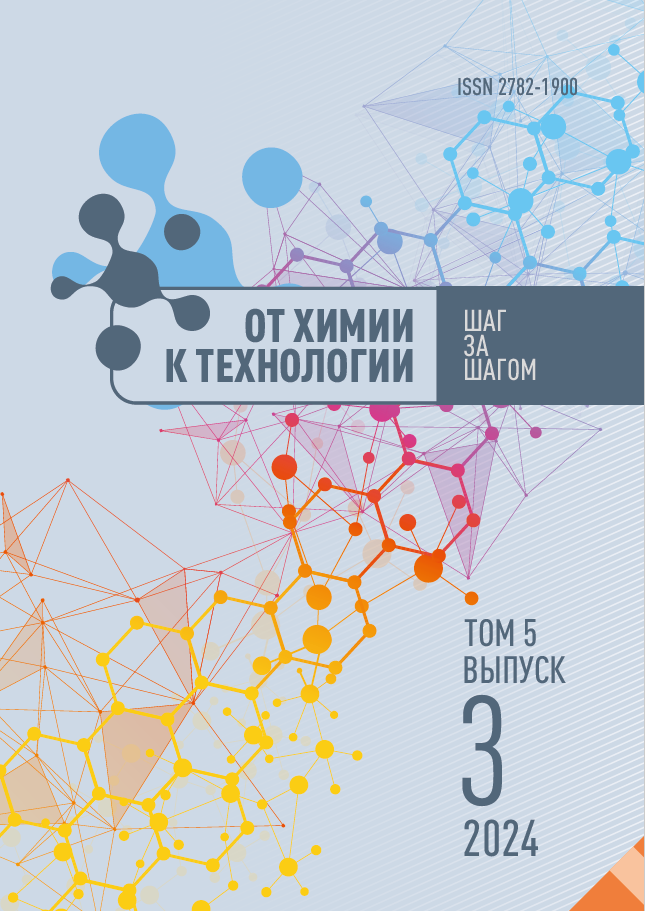Dushanbe, Tajikistan
Dushanbe, Tajikistan
UDC 547-386
The authors developed methods for the synthesis of coordination compounds of iron(III) with thiosemicarbazide (TSC).The compounds structure was proved by IR spectroscopy, conductometry, X-ray diffraction, and thermogravimetry. The authors found the bidentate coordination of TSC with iron(III) via sulphur and nitrogen atoms. Thermogravimetrically authors have established the proceeding of the complex decomposition in two stages. The first stage involves thermolysis of organic ligands with the formation of the corresponding iron salts; the second one includes decomposition of iron salts and formation of iron(III) oxide. Conductometrically we have established the synthesised complexes are strong electrolytes. X-ray diffraction shows the crystallisation of the complexes into orthorhombic syngonies. There are two structural units in the cell.
complexation, synthesis, iron(III), thiosemicarbazide (TSC), IR spectroscopy, conductometry, X-ray diffraction, thermolysis
1. Gazieva, G.A. & Kravchenko, A.N. (2012) Thiosemicarbazides in the Synthesis of Five- and Six-Membered Heterocyclic Compounds, Uspekhi khimii, 81(6), pp. 494–523 (in Russian).
2. Mironov, A.Yu. & Leonov, V.V. (2016) Iron, virulence and intermicrobial interactions of opportunistic pathogens, Uspekhi sovremennoi biologii, 136(3), pp. 285-294 (in Russian).
3. Campbell, M.J-M. (1975) Transition metal complexes of thiosemicarbazideanc, thiosemicarbazones, Coordination Chemistry Reviews, 15, pp. 273–319. DOI:https://doi.org/10.1016/S0010-8545(00)80276-3.
4. Aminjanov, A.A., Kurbanov, N.M. & Akhmedov, K.U. (1990) Complex compounds of rhenium(V) with stiosemicarbazide, Zhurn. neorgan. khimii, 34(10), pp. 2557–2563 (in Russian).
5. Safarmamadov, S.M. (1994) Complex compounds of rhenium(V) with 4-methylthiosemicarbazide, 4-methyl-1,2,4-triazolthiol and their derivatives: Ph.D. Dushanbe (in Russian).
6. Rakhimova, M., Faizullozoda, E.F., Davlatshoeva, J.A. & Eshova, G.B. (2022) Influence of concentration parameters of solution of the homogeneous system Fe(II) - Fe(III) - glycine - Na(H)ClO4 - H2O on the composition of complexes formed, From Chemistry Towards Technology Step-By-Step, 4(1), pp. 15–21. DOI:https://doi.org/10.52957/27821900_2023_01_25 [online]. Available at: URL: https://chemintech.ru/ru/nauka/issue/5032/view (accessed 10.02.2024) (in Russian).
7. Buvrayev, E., Kadirova, Sh., Tillayev, S., Abilkasimova, G. & Tursunova, N. (2021) Synthesis and investigation of mixed bioligand complexes with melamin and glycine, Universum: Chemistry and Biology : electronic scientific journal, 10(88). DOI:https://doi.org/10.32743/UniChem.2021.88.10.12332 [online]. Available at: https://7universum.com/ru/nature /archive/item/12332 (accessed 02.01.2024).
8. Popov, L.D., Raspopova, E.A., Borodkin, S.A., Tupolova, Y.P., Levchenkov, S.I. & Shcherbakov, I.N. (2020) Synthesis and physicochemical study of phthalazinylhydrazone 2-aminopyridine-3-carbaldehyde and metal complexes on its basis, Zhurnal obshchey khimii, 90(3), pp. 432–440. DOI:https://doi.org/10.31857/S0044460X20030138 (in Russian).
9. Lee, H.F., Yang, C.-T., Fan, D., Vittal, J.J. & John, D. (2003) Ranford Synthesis, characterization and physicochemical properties of copper(II) complexes containing salicylaldehydesemicarbazone, Polyhedro, 22(20), pp. 2781–2786. DOI:https://doi.org/10.1016/S0277-5387(03)00402-9.
10. Safarmamadzoda, S.M., Kurbonbekov, D.S. & Muborakkadamov, D.A. (2022) Influence of temperature on the stability of 2-ethylimidazole Au (III) complexes, From Chemistry Towards Technology Step-By-Step, 3(3), pp. 58–64. DOI:https://doi.org/10.52957/27821900_2022_03_58 [online]. Available at: https://chemintech.ru/ru/nauka/issue/5031/view (accessed 23.02.2024) (in Russian).
11. Safarmamadov, S.M., Muborakkadamov, D.A. & Mabatkadamzoda, K.S. (2020) Synthesis and physico chemical exploration complex compounds of gold (3) with triazoles, Vestnik Tadzhikskogo natsionalnogo universiteta. seriya estestvennykh nauk, 1, pp. 154–167 (in Russian).
12. Mashima, M. (1964) The Infrared Absorption Spectra of (NH2CONH-)2, NH2CONHNH2, (NH2CSNH-)2 and NH2CSNHNH2, Bulletin of the Chemical Society of Japan in 1964, 37(7).
13. Wiles, A. & Suprunchuk, T. (1969) The infrared absorption spectra of thiosemicarbazide and related compounds: NH and NH vibrations, Canadian Journal of Chemistry, 47. 1087. DOI:https://doi.org/10.1139/V69-173.
14. Lane, M.D. (2007) Mid-infrared emission spectroscopy of sulfate and sulfate-bearing minerals, American Mineralogist, 92, pp. 1–18. DOI:https://doi.org/10.2138/AM.2007.2170.
15. Nakamoto, K. (1991) IR- and Raman spectra of inorganic and coordination compounds. M.: Mir (in Russian).
16. Kukushkin, Y.N. (1985) Chemistry of coordination compounds. M.: Vysshaya shkola (in Russian).
17. Gorbacheva, S.V. (1974) Practicum on physical chemistry. M.: Vysshaya shkola (in Russian).
18. Lipson, G. & Stuil, G.M. (1972) Interpretation of powder radiographs. M.: Mir (in Russian).
19. Karyakin, Y.V. & Angelov, I.I. (1974) Pure Chemical Substances. M.: Mir (in Russian).
20. Norova, M.T., Shodiyeva, S.F., Khamzayeva, G.C., Rachinskaya, G.F. & Vakhobova, R.U. (2015) Gravimetry and Vatrimetry. Dushanbe: Tadzh. nats. un-t (in Russian).







